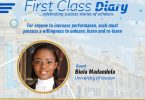First Class Diary: Reading was an Enormous Challenge, Even at Junior School- RI
Hi everyone! It’s the third edition in the June series. The feedbacks from last series have been really amazing.
This week, I have another interesting interview for you. I am certain you will enjoy it.
I present to you, my scholar for the week. Please meet, Miss Ruth Innocent, a first-class graduate of Law from Rivers State University.
Did you ever had challenge with reading? Her journey to first class was indeed an inspiring one.
In her words,
Reading was an enormous challenge, even at junior secondary school. I had attended a secondary school known as Alpha Academy. So, I was nicknamed ‘APM’ by my classmates, which meant ‘Alpha Photocopying machine’.
Enjoy!
Abigael Ibikunle of Edugist: Please share with Edugist, a little about your background.

Ruth Innocent
Ruth Innocent: My name is Ruth Innocent and I am from Rivers State, Abua/Odual Local Government Area precisely. I was born in Rivers State into the family of five children, and I’m the first child.
The beginning of my academic journey was not a smooth and bright one. It was known for failure. I had my primary education in my village.
Surprisingly, reading was an enormous challenge, even at my junior secondary school.
I had attended a secondary school known as Alpha Academy. So, I was nicknamed ‘APM’ by my classmates, which meant ‘Alpha Photocopying machine’.
This name depicts the extent to which I could copy in exam since I couldn’t write on my own. I couldn’t understand what was being taught.
On countless nights, I would weep for my consistent failure.
What spurred my morale to excel academically, was my usual ordeal of copying in the exam. On that fateful day, I had written the right answer on my exam paper.
However, I cancelled it after copying the wrong answer from a supposed brilliant student in my class.
This discovery after the exam changed everything. I made a personal determination never to copy again during exam. I said to myself ‘Ruth, you must study’.
That single determination earned me 3rd position in a class of about 54 students. This was an exponential shift from my previous 16th and 17th positions. I was able to write my WAEC, NECO,GCE, JAMB, Post UTME at a single sitting.
In 2014, I gained admission into Rivers State University to study law. I applied my slogan of diligence, hardwork, and Godliness into my studies throughout my course years. That earned me a first class honors in law. I graduated with a CGPA of 4.78 out of a 5.0 grade scale.
Fortunately, I emerged the best graduating student in my faculty. From my academic journey so far,
I learnt that sometimes, all what you need is consciousness of your failure and self determination to succeed. And until you succeed, you might constantly be a subject of mockery.
AI: Was there any motivating factor(s) that influenced your choice of discipline and institution?
RI: Well, there wasn’t any motivating factor. I did a self evaluation of the subjects I was competent in and they all tended towards law, so I chose that.
Although, my father wanted me to read a professional course, he wasn’t the decisive factor of my choice.
My choice of university was borne out of my desire to be close to my family. Since it was within my state, I felt the cost of education would be lesser.
AI: There are two major skills that every student must possess: COMPETENCE and PERFORMANCE. While competence revolves around skill acquisition, performance is much more concerned about skills application. It is believed that most graduates are competent because their academic performance testifies to this, but they are performance-challenged. This poor performance ipso facto hinders them from getting lucrative jobs in the labour market. What can you say about this assertion?
RI: This assertion is not entirely true and not entirely false as well. I have seen students who were competent as seen on their excellent grades. And they are performing excellently as well in their jobs.
They did not just get lucrative jobs on the basis of assumptions of their intelligence. They’re also performing greatly in terms of the application of the skills acquired during their course of study.
Similarly, I have seen people who did perfectly well academically. But, problem arises when they are employed into the labour market. Serious challenges happen when it is time to demonstrate their excellence.
Application of their knowledge to solve real life problems becomes a challenge. In such situations, one can say, gathering all the A’s and B’s in the university world is not enough.
It is not a determining factor of getting and sustaining a lucrative job or being able to establish same.
AI: What do you think is responsible for competence without performance? Please suggest ways of improving the performance level of university students and graduates
RI: Firstly, the educational system we find ourselves is a major contributing factor to competence without performance.
We spend so much time teaching and learning theories in the university. Not so much time is exerted towards the practical aspects of the course.
Some universities have realized this and have included more practical courses in their curriculum. There are some who have not and so, the defects will be seen from the graduates of such universities.
Also, the mentality of students while in the university is a contributing factor. Some students generally believe that getting good grades will earn them lucrative jobs upon graduation.
Hence, little or no attention is paid towards performance. The aim is to just get the A’s and B’s.
By way of suggestion, our university curriculum should be tailored more towards practical skill acquisition in learning.
This will help to bridge the gap. There wouldn’t be so much of a difference between the university environs and the labour market since the key word is ‘competence’.
Moreso, the privilege mentality of students that excellent grades means lucrative jobs should be self cautioned. Performance is what keeps one in the labour market and not necessarily the grades.
Thus, in pursuit of good grades/competence in school, there should also be the thirst for performance.
No one will eat your A’s. The question is, what can we eat with your A’s?
AI: Achievement in life transcends one’s personal efforts. There were people who, during your programme, rendered some assistance that made your dreams a reality. Who are specific persons whose contribution you can’t forget in your first-class feat?
RI: I’m constantly grateful to God for my parents, Mr. Alimon Innocent and Mrs. Tebhon Innocent. They always encourage me to be diligent in my studies.
My father will always say, ‘you cannot be valuable if you are not educated’. That kept me going.
I cannot forget my principal in my secondary school, Mr. Nams Friday who taught me ‘A,B,C, D’ in my JSS1. Lol! That’s quite funny, Mr. Esema Precious, Mr. Kalu Obinali.
I cannot forget my lecturers: Prof. Chris Wigwe, Dr. O.W Arugu, Frank Igwe Esq. My very good friend turned lecturer, G.C Okara Esq., Mary Allagoa is a mother figure who spurred me to be diligent too.
AI: As a first-class graduate, are you currently gainfully employed?
RI: No, I am not yet employed. I am currently a student of the Nigerian Law school, Lagos Campus precisely.
AI: Do you think your grades have or is giving you any major advantage over other graduates with lesser grades?
RI: No. I don’t think so. Although, one cannot deny the facts that some students who graduated with first class are given instant employment even on the day of their convocation.
Similarly, there are scholarship bodies whose application criteria is either a first class or a second class upper. From this angle, the advantages are visible.
That notwithstanding, I believe everyone, no matter the grades, is endowed with great potentials to do great in their chosen field.
Still, some persons have chosen to feel less of themselves. This is because their first class dream never came to a reality.
They have forgotten that the key word is performance and not necessarily competence in terms of good grades.
AI: For students who aspire to graduate with outstanding grade like yours, what would you advise them?
RI: I would say such a student must develop self determination to be outstanding, eroding all thoughts of negativities. That is what will keep you going.
Also, you must be diligent in your studies in all your semesters. Inculcating discipline is what will help you to be diligent.
My lecturer, prof. O.W Wigwe once said that, a first class student is not the most intelligent student in the class, but the most disciplined.
Most importantly, you must consistently pray to God to help you succeed. The race is not to the swift!
AI: What would you advise the government to do to improve the standard of our education system?
RI: The tertiary institutions should be more equipped in terms of infrastructure. This will improve practical training in the educational sector.
In addition, lecturers should be well remunerated. It will encourage them to put in their best towards their unending task of teaching.
Moreover, incessant strikes which is like a virus eating the nectar of the educational system should be prevented by the government.
This can be prevented by meeting the needs of the educational sector.
AI: Any other thing you would like to share?
RI: No one was born with a first class. I only realised I can get it if I am disciplined to my course of study.
That’s it for this week’s episode. I hope you enjoyed the interview. Got a scholar you would love to be featured?
Would you like to sponsor any of our scholars you find their stories inspiring?
To contact any of them for engagements,
Please reach out to me directly: abigail@edugist.org or call me directly +2347035835612.
I am Abigael Ibikunle and celebrating excellence is a top priority for me. iTeach, iSpeak, iTrain, iFacilitate, iWrite, iInterview and iLoveYou all. Smile! See you next week!









[…] everyone! It’s the fourth edition in the June series. The feedbacks from last series have been really […]